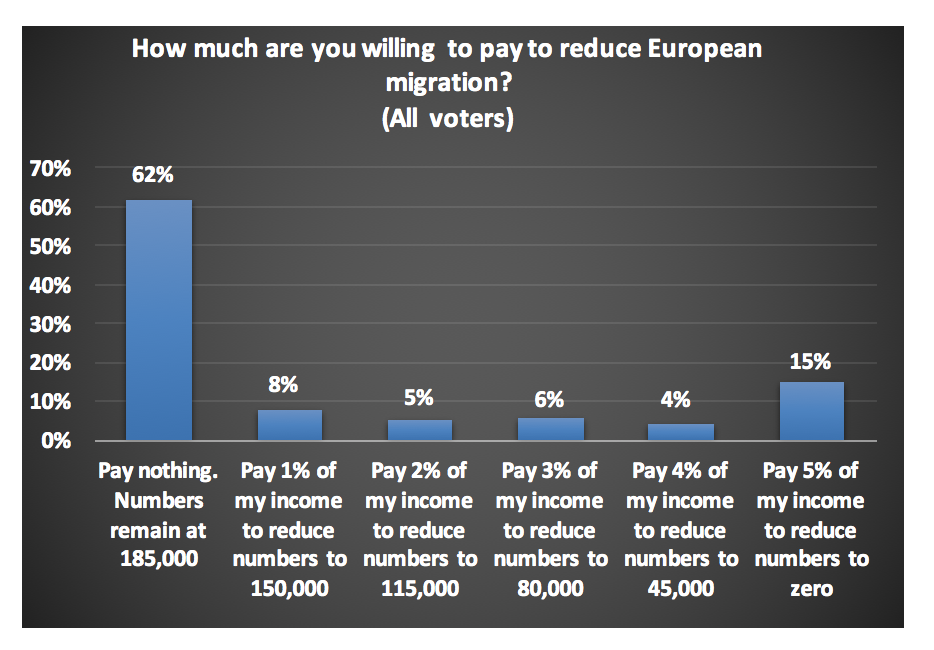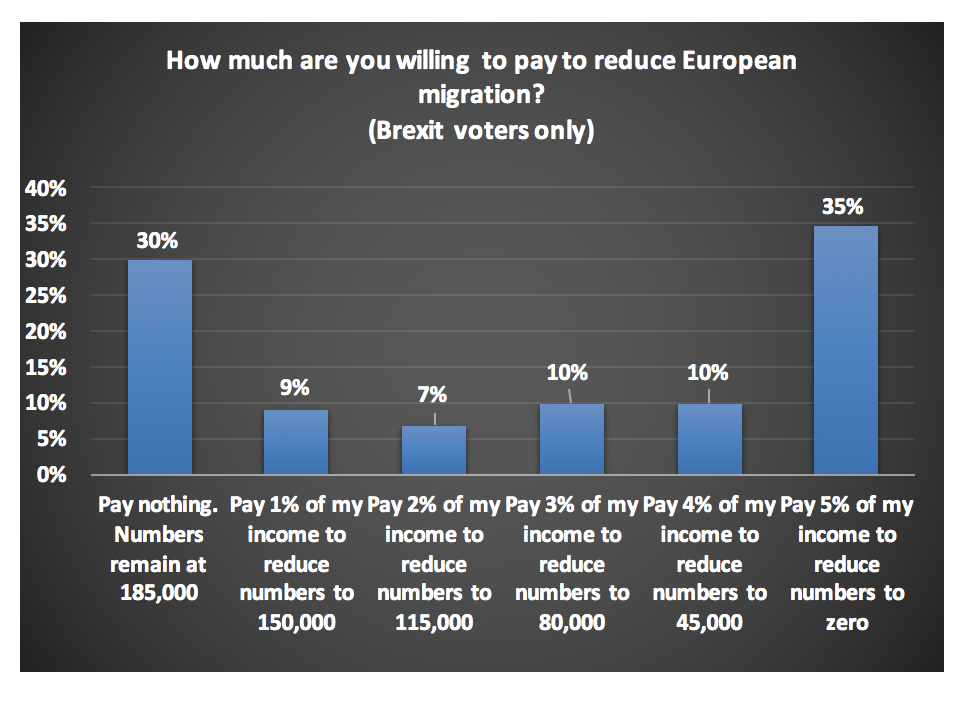 Lowering immigration was the key motivation behind the Brexit vote, and how to achieve it dominates the current political debate. Drawing on new data, Eric Kaufmann analyses the propsects of support for a hard and a soft Brexit, based on how much Britons would be willing to pay to reduce the number of Europeans entering the UK.
Lowering immigration was the key motivation behind the Brexit vote, and how to achieve it dominates the current political debate. Drawing on new data, Eric Kaufmann analyses the propsects of support for a hard and a soft Brexit, based on how much Britons would be willing to pay to reduce the number of Europeans entering the UK.
A new survey shows most Britons are not willing to pursue hard Brexit if it will cost them personally. Thus far, the economic indicators post-Brexit don’t look bad. Consumer spending and investment are holding up well, despite a lower pound. But if the going gets tough, there is a two-thirds majority willing to accept current levels of EU migration to retain access to the single market.
The leading motivation for Leave voters was reducing immigration while Remain voters prioritised the economy. This hasn’t changed. According to my YouGov/Birkbeck/Policy Exchange survey data, two-thirds of British people want less immigration, including 47 percent of Remainers and over 91 percent of Leavers.
Hard Brexit is a good way to bring numbers down. However, some suggest that when Theresa May triggers Article 50, the EU will drive a hard bargain, inflicting pain on the British economy. With economistsclaiming entry to the single market is worth 4 percent of GDP by 2030, I asked how much the average Briton is willing to sacrifice to reduce European immigration in the event the doomsayers are right. The final deal between Britain and the EU over leaving will hinge on how much economic pain, in the form of reduced market access, Britain is prepared to absorb to restrict European immigration.
The survey, carried out by the polling firm YouGov, asked a sample of over 1500 people the following question: “Roughly 185,000 more people entered Britain last year from the EU than went the other way. Imagine there was a cost to reduce the inflow. How much would you be willing to pay to reduce the number of Europeans entering Britain?” The options ranged from “pay nothing” for no reduction to paying 5 percent of personal income to reduce numbers to zero. Each percent of income foregone reduced the influx by 35,000. The results are shown in figure 1.
 Source: YouGov survey, August 20, 2016.
Source: YouGov survey, August 20, 2016.
Among those surveyed, and excluding those who didn’t know, 62 percent said they were unwilling to pay anything to reduce numbers, and would accept current levels of European immigration.
 Source: YouGov survey, August 20, 2016.
Source: YouGov survey, August 20, 2016.
As figure 2 shows, even among those who said they voted to leave the European Union, 30 percentreported they would prefer the current inflow of 185,000 to paying any of their income to cut the inflow. In other words, there is a significant ‘soft’ component within the Leave vote.
On the other hand, there is a considerable core of Brexit voters willing to tighten their belts to reduce migration: over a third of Leave voters indicated they would contribute 5 percent of their income to cut European migration to zero. More than half of Brexiteers are willing to pay at least 3 percent of their income to reduce European net migration from the current 185,000 to under 80,000. The average person who voted Conservative in the 2015 General Election is willing to stump up 2.5 percent of their pay packet to reduce European immigration to half its current level.
This means that if the costs of Brexit mount in line with pessimistic predictions, most British people favour a deal that preserves market access even if this results in only limited reductions in European immigration. May’s Conservative voters will put up with more pain, but not if it costs more than 2 percent of GDP. This suggests a deal between Theresa May and her EU interlocutors based on significant market access in exchange for limited migration controls may be acceptable to the 45 per cent of voters who currently back her party. It certainly will pass muster with a majority of the electorate.
If the economy continues to hold steady, the question is moot and hard Brexit remains a strong option. But if pain is on the way after Article 50, Middle Britain will be inclined to prefer soft over hard Brexit.
Please read our comments policy before commenting.
Note: This article originally appeared at LSE British Politics and Policy. It gives the views of the authors, and not the position of EUROPP – European Politics and Policy, nor of the London School of Economics.
_________________________________
 Eric Kaufmann is Professor of Politics at Birkbeck College, University of London. He is the author of The Rise and Fall of Anglo-America: the decline of dominant ethnicity in the United States (Harvard 2004), Shall the Religious Inherit the Earth (Profile 2011). His latest publication is a Demos report, freely available, entitled Changing Places: the White British response to ethnic change. He tweets as @epkaufm.
Eric Kaufmann is Professor of Politics at Birkbeck College, University of London. He is the author of The Rise and Fall of Anglo-America: the decline of dominant ethnicity in the United States (Harvard 2004), Shall the Religious Inherit the Earth (Profile 2011). His latest publication is a Demos report, freely available, entitled Changing Places: the White British response to ethnic change. He tweets as @epkaufm.




you have to love the Polls, they get twisted & turned to propagate the line of thinking of the political elites those same few that think they know better than the people that provide the cash that they spend on their vanity projects.
It would appear that Teresa May isn’t interested in listening to polls or public opinion….and definitely not ‘experts’.
Thanks to the 52% Yes vote the Tory mantra is ‘the people have spoken’ and they are now entitled to do what they want where Brexit is concerned. Many polls suggest the Yes vote didn’t reflect what the majority of adults want, which is to remain in the EU. The cost of halting immigration may add even more people to this group…but that won’t influence the govt.
I doubt if the govt. will even let ‘the people’ know the true economic cost, although the treasury minister, when pinned down on Newsnight, refused to deny that a 4% permanent reduction in national income was the best case Brexit scenario, according to Treasury figures that the govt were relying on.
It’s worth noting that those voting for Brexit were just 37.4% of the total electorate. Only 70% of them are evidently willing to accept any income reduction at all in order to limit immigration, even though we are told to expect a 4% reduction in GDP following (a hard, presumably) Brexit. That 70% constitutes a mere 26% of the total electorate, Nothing in either the referendum result or these latest poll figures can justify opting for an outcome that will unnecessarily adversely affect the incomes of some three quarters of the total electorate. Since Theresa May seems bent on taking decisions herself for the whole country under the royal prerogative, let us hope that Parliament has the guts to stand up to her and insist on a form of Brexit that is clearly in line with the views of the great majority of the electorate and not those of the fundamentalists she is surrounded by. Indeed the governance of the EU is subject to much greater democratic control than is our own government – so much for “bringing back control”!
We are now just beginning to see the start of the economic impact hitting the man in the street. However I’m afraid I disagree with the author on the impact that will have.
Sadly I don’t think there will be a chorus of “mea culpa!” from Brexit voters and the right wing press followed by a change of heart. I think worsening economic conditions will increase extremism and increase verbals attacks on Europe and immigrants.
This will of course create a horrible loop of anger, creating bad policy, creating worse economic conditions, creating more anger.